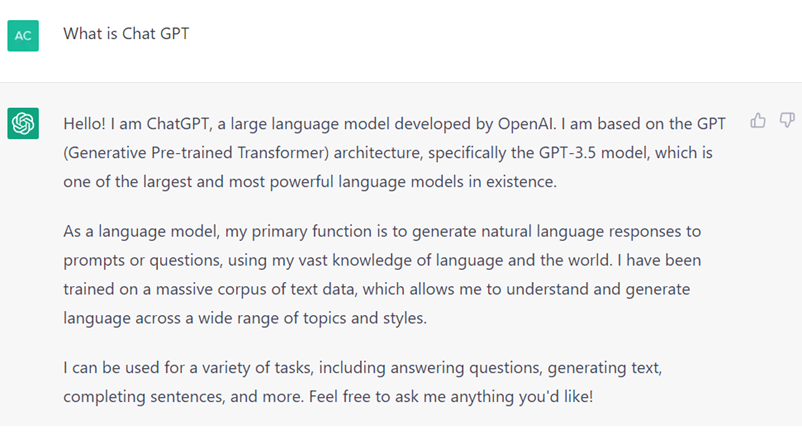We can't ignore ChatGPT
It's Not Going Away
Posted on
March 22, 2023
Unless you are avoiding the news, you likely have heard something about ChatGPT and other forms of artificial intelligence producing relatively high-quality writing. Before I take a deeper dive into what ChatGPT is, keep in mind, we’ve been dabbling with this type of technology with voice assistants such as Siri and Alexa for some time now, just at a lower level. Both Siri and Alexa are highly limited in comparison. So, I thought I would ask ChatGPT to define itself. First, I created an account on chat.openai and confirmed my account, etc. Within about one minute, I found myself typing in my question, “What is ChatGPT?” Please see ChatGPT’s response below:

While it provides some technical details, it is general enough for a non-computer, AI-illiterate individual to gain a good understanding of this – well, let’s call it a tool, is. There are many uses for ChatGPT, some intended, others not. It certainly has created confusion and consternation in education as faculty talk about their concerns around cheating.
Any one in higher education knows the academe is slow to adapt and respond to change. While ChatGPT is here and more advanced versions will surely follow, it is hard to be anything but reactionary. What higher education cannot do is sit back and opt to figure out the benefits and implications tomorrow. We have to embrace that ChatGPT is here and do the following:
- Educate ourselves on this new and vast technological tool – we cannot talk about it or make decisions around it, if we don’t really understand what it is, what it can do, and the pros and cons. And for all my Drexel readers, our Teaching and Learning Center is providing tips and will be offering a workshop.
- Educate our students – this is a tool like any other. Some tools are welcome in the classroom or to supplement the learning process, others are not. We must have the conversations around the ethics, the implications, the benefits, etc. of this tool. How will this impact not just education, but business, and more important - free speech, democracy, truth in reporting, the dissemination of false information, etc. And how can it also help?
- Determine how it could be used in the classroom – we clearly don’t want our students using ChatGPT to write their essays, but could we not find ways to use it to enhance the learning experience? For example, in my upcoming class, I will be asking students to have ChatGPT write a short essay and then ask the students to critique it – everything from the strength of the thesis, flow of the narrative, mechanics, use of language, and sourcing, etc. I’m looking forward to the dialogue that will no doubt ensue.
- Finally, keep the discussion going as ChatGPT continues to evolve.
There are no doubt pros and cons to consider when thinking about ChatGPT. I can see potential benefits in writing manuals or process documents, at least to get an initial draft. I can see it being used effectively to deepen chat bots, etc. However, I also believe it has significant limitations. A robot will never be a living, breathing person. As a creative writer, I know that while ChatGPT may be able to draft a short story about watching a person take their last breath, a robot has not seen, and therefore, cannot convey, how the breathtaking purple and pink hues of an early morning sunrise steal my breath as I am taken back to watching my mother take her last breath. Gail Terry Grimes in her piece on ChatGPT writes, “Writing is courage... AI lacks: call it consciousness, awareness, heart, soul, whatever, it’s what clicks in when we learn that an earthquake has trapped fifty thousand of our brothers and sisters under rubble.” And I will agree with Grimes that it’s fine for ChatGPT to write a manual, but I’ll also argue that even writing a manual – while technical, should include the human element. But these concerns and factors do not mean that we should run from it, quite the contrary. As a professor, I have an obligation to take the deeper dive and learn more about it – the benefits and drawbacks, and to ponder and discuss with colleagues and students the potential implications.
We cannot wait for others to tell us how, or whether, this tool can or should be used. We need to accept ChatGPT is here and figure out how to best utilize it. There is no doubt there are some incredible benefits. We also need to have open discussion about what it cannot do, and maybe more important, dialogue around what it should not do.
Best,
Anne Converse Willkomm
Associate Dean, the Graduate College
Associate Teaching Professor, Dept. of Communication, College of Arts & Sciences
Drexel University